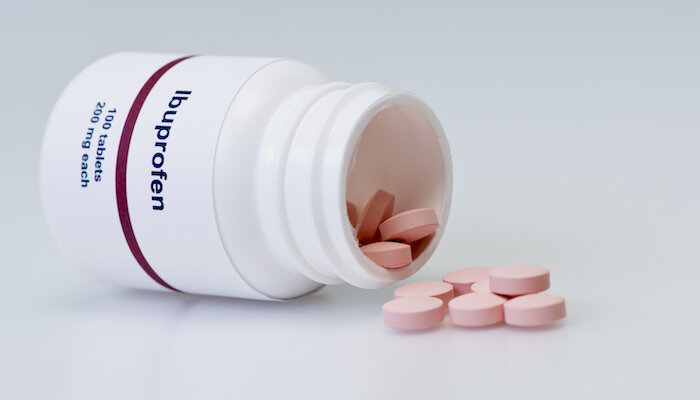
Nonsteroidal anti-inflammatory drugs (NSAIDs) treat pain. They also relieve inflammation and reduce fevers. Over-the-counter NSAIDs include pills like aspirin, ibuprofen, and naproxen sodium, and creams you apply to your skin. Your doctor can also prescribe these pain relievers in a high-dose or more targeted version, like celecoxib (Celebrex) for arthritis.
How They Work
These drugs block inflammatory proteins in the body, called COX-1 and COX-2, to cut inflammation and ease the pain. That reduces swelling and fevers, too. Aspirin, unlike other NSAIDs, also prevents your blood from forming clots, which can protect you from heart attacks and strokes. The others may promote clots.
Conditions NSAIDs Treat
People take these pain relievers for all kinds of aches, including muscle strains, headaches, menstrual cramps, toothaches, gout, bursitis, backaches, and arthritis. They reduce the fever and pain that comes along with a cold or the flu too. NSAIDs can also ease joint swelling that comes from inflammation.
How Long Should You Use Them?
These OTC painkillers are for short-term use. You shouldn’t take them for more than 10 days for the pain and 3 days for fever. If you take them for too long, you are at higher risk for side effects. If you feel you need to take NSAIDs regularly for arthritis pain, talk to your doctor to be sure it’s safe for you. They may suggest other pain relief options.
Side Effects
In some people, NSAIDs can cause stomach pain, nausea, bleeding, ulcers, gas, bloating, diarrhea, or constipation. NSAIDs other than aspirin can also raise your risk of heart attack or stroke, even after just 1 week.
How to Prevent Side Effects
Stomach problems are the most common complaint people have about these drugs. To avoid nausea or a belly ache, take your NSAID with food, milk, or antacids. Your doctor can also prescribe acid-controlling medicine to take with NSAIDs to protect your stomach and prevent ulcers.
Who’s at Risk for Side Effects?
You might face a greater chance of ulcers or stomach bleeding when you take NSAIDs if you’re older, smoke, drink alcohol, have advanced liver disease, are in generally poor health, or if you also take prescription blood thinners, steroids, or SSRI or SNRI antidepressants.
How Soon Do NSAIDs Work?
When you take them for short-term or acute pain, such as a headache or muscle strain, these drugs may do the trick in just a few hours. If you have an ongoing or chronic problem, like arthritis, you need more time to build up a certain amount of the medicine in your blood for it to work best.
How to Take Them Safely
Keep track of how many doses you’ve taken. Only take the smallest dose you need. The label will say how much you can take within a 24-hour period. Don’t go over that amount. Never mix two or more drugs that contain NSAIDs, including cold medicine. If you take daily aspirin for your heart, don’t take another NSAID too. It could put you at higher risk for dangerous side effects.
Who Shouldn't Take NSAIDs?
Don’t take them before or after heart bypass surgery or if you’ve had a recent heart attack. It may put you at risk for a second heart attack. Also, if you’re pregnant, don’t take NSAIDs after the 29th week. If you’ve taken them in the past and had an allergic reaction like hives or breathing trouble, don’t try them again.
NSAID Alternatives
If you can’t take these medications or they don’t do much for you, acetaminophen (Tylenol) is another option. It works in a different way, so when NSAIDs don’t help, this alternative could. But, keep in mind, acetaminophen only treats pain, not inflammation. It can also help reduce fevers.
1 COX, Not 2
Some people who can’t tolerate the stomach-related problems that NSAIDs may cause can use prescription celecoxib instead. NSAIDs block two types of COX enzymes, including one that also protects your stomach. Celecoxib only blocks the COX enzyme that causes inflammation and pain. However, high doses of celecoxib could still cause side effects like bleeding.
Antidepressant, Anti-Seizure Meds
Some antidepressants can relieve ongoing pain too. The ones that have this effect include tricyclics, or SNRIs like duloxetine (Cymbalta), milnacipran (Savella), or venlafaxine (Effexor). Anti-seizure drugs, like gabapentin (Neurontin) or pregabalin (Lyrica), may ease nerve or fibromyalgia pain.
Herbal Pain Relievers
Plant-based remedies, including ginger, turmeric, and garlic, may help you manage arthritis pain because of their anti-inflammatory effects. Creams with capsaicin, or chili pepper oil, can ease joint pain, too. The spicy chemical may cut off or reduce pain signals to your brain. But you might need to use it for a few weeks to feel a difference.
A Feel-Good Lifestyle
Your daily habits can help you manage pain. Exercise releases endorphins, your body’s natural pain-relief chemicals. On the other hand, stress can make you feel worse. Find ways to relax, such as meditation, and you may not hurt so much. Enough sleep is also key. Make sure you get plenty of shut-eye to help you cope with chronic pain.
Precision Pain Care and Rehabilitation has two convenient locations in Richmond Hill – Queens and New Hyde Park – Long Island. Call the Richmond Hill office at (718) 215-1888, or (516) 419-4480 for the Long Island office, to arrange an appointment with our Interventional Pain Management Specialist, Dr. Jeffrey Chacko.













